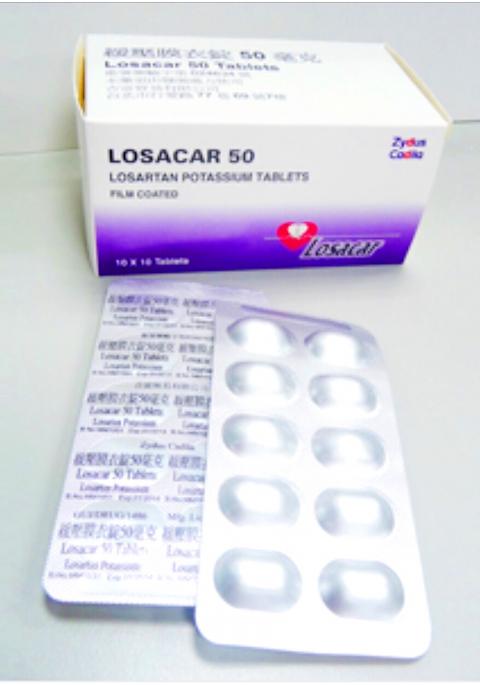The Food and Drug Administration (FDA) has ordered that two generic blood pressure drugs be removed from shelves, after its US counterpart found new potentially carcinogenic impurities in them.
The first, Losacar 50 Tablets (50mg), is made by Hetero Labs Ltd in India and is distributed by Chi Fu Trading Company (吉富貿易有限公司), the FDA said in a news release on Saturday night, adding that about 2.18 million of the tablets had been imported.
The second, Hysartan FC Tablets 50mg/12.5mg, is made by Anxo Pharmaceutical Co (瑩碩生技醫藥) in Taiwan, which had used Losacar from Hetero Labs in about 66 of its batches, or 29.7 million tablets, it said.

Photo: Wu Liang-yi, Taipei Times
Hetero Labs announced a recall of its tablets after tests showed that they contained n-nitroso-n-methyl-4-aminobutyric acid, a known animal and potential human carcinogen.
The recall was the latest in an ongoing investigation into angiotensin receptor blockers (ARBs, also known as sartans), which are used to treat conditions such as high blood pressure and heart failure.
SUSPECT DRUGS
In July last year, many ARB medications from companies around the world were recalled, as they were found to contain impurities that are suspected carcinogens: n-nitrosodimethylamine and n-nitrosodiethylamine.
The FDA said it has asked Hetero Labs to confirm whether the batches imported into Taiwan were from the lots that might have been contaminated, adding that it would also test samples of the drugs that are being removed from shelves.
It urged people who are taking the affected drugs not to suddenly stop taking them, but consult their doctor to discuss alternative drugs.

MORE VISITORS: The Tourism Administration said that it is seeing positive prospects in its efforts to expand the tourism market in North America and Europe Taiwan has been ranked as the cheapest place in the world to travel to this year, based on a list recommended by NerdWallet. The San Francisco-based personal finance company said that Taiwan topped the list of 16 nations it chose for budget travelers because US tourists do not need visas and travelers can easily have a good meal for less than US$10. A bus ride in Taipei costs just under US$0.50, while subway rides start at US$0.60, the firm said, adding that public transportation in Taiwan is easy to navigate. The firm also called Taiwan a “food lover’s paradise,” citing inexpensive breakfast stalls

TRADE: A mandatory declaration of origin for manufactured goods bound for the US is to take effect on May 7 to block China from exploiting Taiwan’s trade channels All products manufactured in Taiwan and exported to the US must include a signed declaration of origin starting on May 7, the Bureau of Foreign Trade announced yesterday. US President Donald Trump on April 2 imposed a 32 percent tariff on imports from Taiwan, but one week later announced a 90-day pause on its implementation. However, a universal 10 percent tariff was immediately applied to most imports from around the world. On April 12, the Trump administration further exempted computers, smartphones and semiconductors from the new tariffs. In response, President William Lai’s (賴清德) administration has introduced a series of countermeasures to support affected

CROSS-STRAIT: The vast majority of Taiwanese support maintaining the ‘status quo,’ while concern is rising about Beijing’s influence operations More than eight out of 10 Taiwanese reject Beijing’s “one country, two systems” framework for cross-strait relations, according to a survey released by the Mainland Affairs Council (MAC) on Thursday. The MAC’s latest quarterly survey found that 84.4 percent of respondents opposed Beijing’s “one country, two systems” formula for handling cross-strait relations — a figure consistent with past polling. Over the past three years, opposition to the framework has remained high, ranging from a low of 83.6 percent in April 2023 to a peak of 89.6 percent in April last year. In the most recent poll, 82.5 percent also rejected China’s

PLUGGING HOLES: The amendments would bring the legislation in line with systems found in other countries such as Japan and the US, Legislator Chen Kuan-ting said Democratic Progressive Party (DPP) Legislator Chen Kuan-ting (陳冠廷) has proposed amending national security legislation amid a spate of espionage cases. Potential gaps in security vetting procedures for personnel with access to sensitive information prompted him to propose the amendments, which would introduce changes to Article 14 of the Classified National Security Information Protection Act (國家機密保護法), Chen said yesterday. The proposal, which aims to enhance interagency vetting procedures and reduce the risk of classified information leaks, would establish a comprehensive security clearance system in Taiwan, he said. The amendment would require character and loyalty checks for civil servants and intelligence personnel prior to